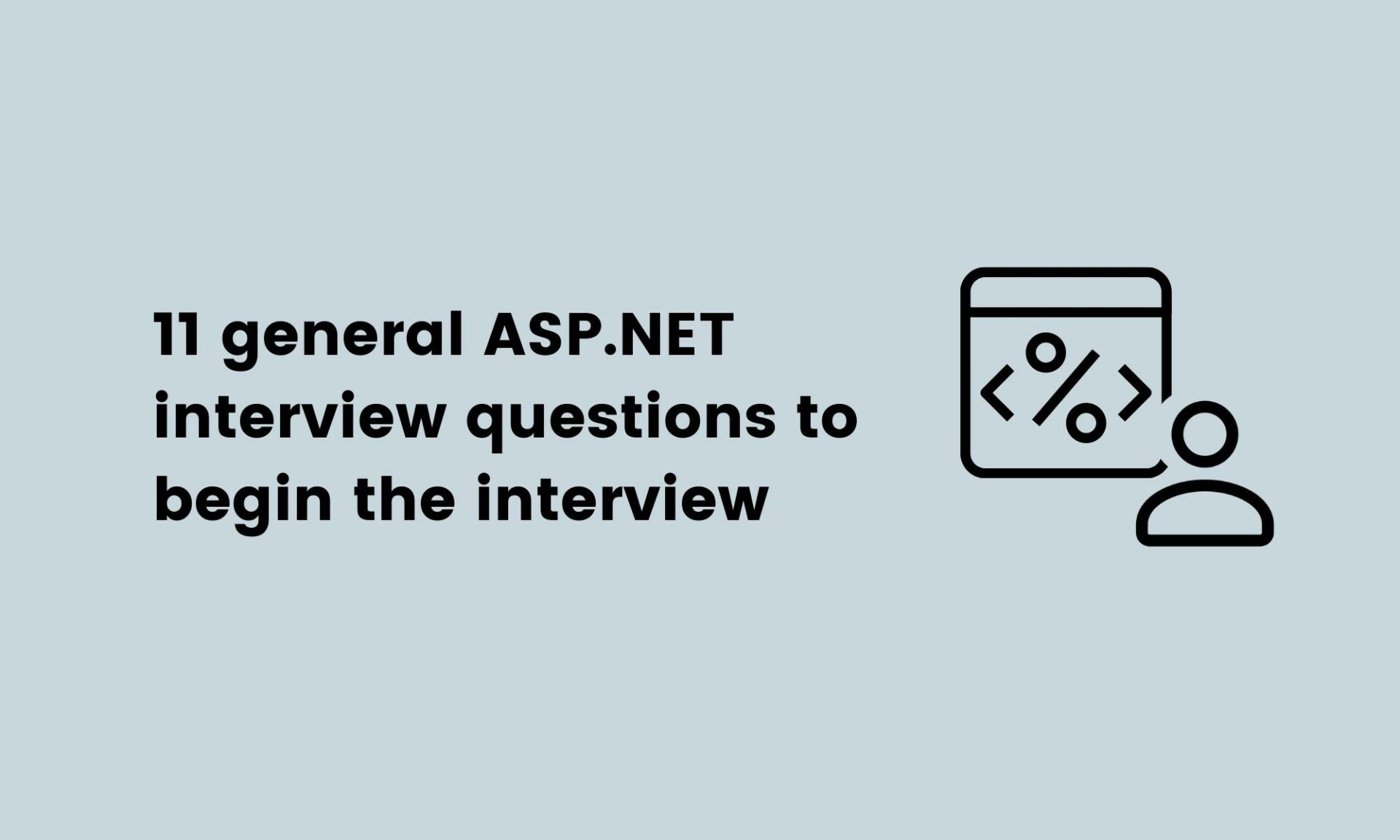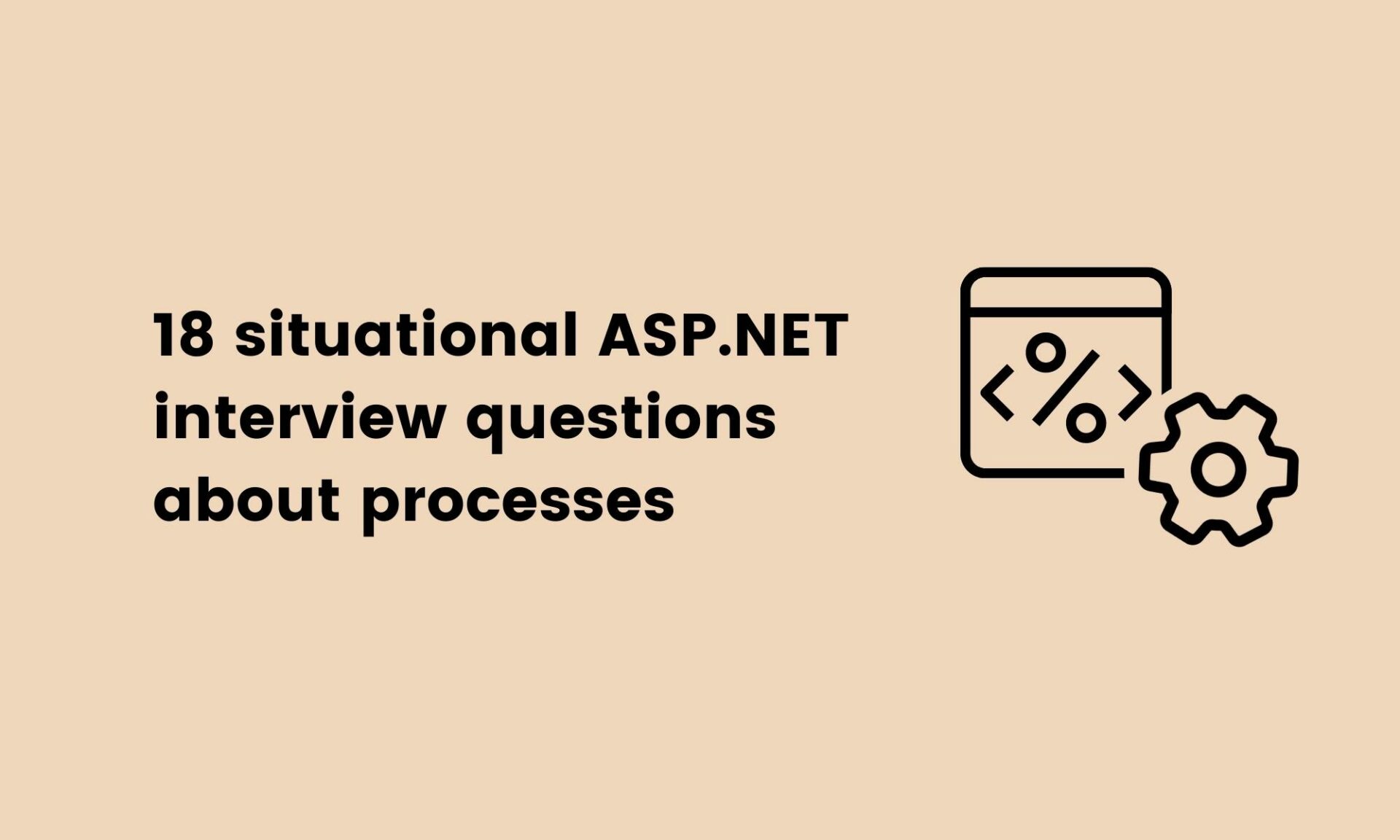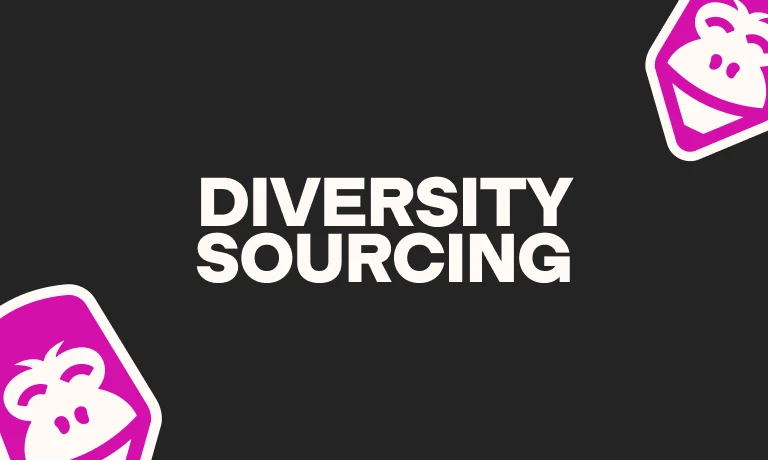100+ ASP.NET interview questions to ask your next developer
ASP.NET, short for Active Server Pages Network Enabled Technologies, is a vital open-source framework that developers can use to make dynamic web pages. But to make full use of this framework, they should understand its intricacies and complexities. And for this, your next new hire should have excellent ASP.NET skills.
What’s the best way to tell whether your applicants have the right ASP.NET skills? We advise using a combination of two methods: skills tests and technical interview questions.
Use an ASP.NET skills test to review applicants’ skills early on in your hiring process to identify the best talent. Then, perform an in-depth assessment of the skills of shortlisted candidates by using the right ASP.NET interview questions.
In this article, you’ll find a selection of the best ASP.NET interview questions to ask your applicants, along with sample answers to the most important ones to help you review responses.
Check them out below.
Table of contents
- 11 general ASP.NET interview questions to begin the interview
- 5 general ASP.NET interview questions and answers to review your engineers’ responses
- 74 ASP.NET interview questions to review your engineers’ technical knowledge thoroughly
- 5 ASP.NET interview questions and answers to assess applicants’ technical knowledge
- 18 situational ASP.NET interview questions about processes
- 5 situational ASP.NET interview questions and answers about processes
- 10 tips for using these ASP.NET interview questions to hire the best
- Which ASP.NET skills should you evaluate during the interview phase?
- Hire an expert ASP.NET developer with our ASP.NET interview questions and skills tests
11 general ASP.NET interview questions to begin the interview
The 11 general ASP.NET interview questions listed in this section are ideal for starting the interview.
Ask your applicants the following questions to gauge their general understanding of ASP.NET and learn more about their skills and experience.
Describe your experience with ASP.NET.
Describe your best ASP.NET-related skills.
Which ASP.NET skills are you trying to improve?
Explain how managed code is different from unmanaged code.
Describe three soft skills that are crucial for ASP.NET developers.
Name the version of ASP.NET you’re most familiar with.
What are the main features of ASP.NET?
Is ASP.NET open-source?
How do you remain knowledgeable of current ASP.NET developments?
What do you see yourself achieving as an ASP.NET engineer in the next three years?
Which ASP.NET technical skills are vital for engineers?
5 general ASP.NET interview questions and answers to review your engineers’ responses
In this section, we’ve provided sample answers to five of the general ASP.NET interview questions. Use them to review your prospective employees’ skills during and after the interview phase.
1. Describe three soft skills that are crucial for ASP.NET developers.
Soft skills are critical for software engineers, so your applicants should know which skills are particularly important for completing projects successfully and be able to explain why.
Some essential soft skills for software developers include communication, critical thinking, and problem-solving skills.
2, Explain how managed code is different from unmanaged code.
Not only should your applicants be capable of defining these two types of code, but they should also be able to explain a practical use for each of them.
Skilled applicants will know that functionality is a factor that makes managed code different from unmanaged code. They will be able to explain that managed code works with the CLR function, whereas unmanaged code requires the engineer or developer to compose it.
3. Is ASP.NET open-source?
Any engineer or developer who has used ASP.NET in the past should be aware that this web application framework is open-source.
4. Which ASP.NET skills are you trying to perfect?
Top applicants who are well-versed in ASP.NET should always search for ways to enhance their skills.
Whether they want to learn older programming languages, such as JavaScript, or new frontend technologies, such as React and Angular, check whether your applicants are actively looking for ways to improve and upskill. This is particularly important for more complex projects.
Should you need to assess the skills they’re working on, you can use our skills tests, for example for React and Angular.
5. Which ASP.NET technical skills are vital for engineers?
Some of the essential technical skills your applicants may mention when responding to this ASP.NET interview question include knowledge of the Bootstrap framework and skills in HTML and CSS (which are an integral part of web development technology).
The best insights on HR and recruitment, delivered to your inbox.
Biweekly updates. No spam. Unsubscribe any time.
74 ASP.NET interview questions to review your engineers’ technical knowledge thoroughly
The 74 ASP.NET interview questions in this section are ideal for digging deeper into your applicants’ knowledge.
Ask your candidates some of these questions to learn whether their ASP.NET technical expertise matches your requirements.
Explain what CLR refers to.
Explain what ASP means.
Explain what ASP.NET is.
Explain the differences between ASP.NET and ASP.
Explain what IIS means.
Explain what IIS is used for.
Explain what multilingual websites are.
Explain what caching means.
Which requirements are essential to consider when caching?
Name five ASP.NET advantages and explain them.
Explain what the PostBack request refers to in ASP.NET.
Explain what IsPostBack does in ASP.NET.
Name the parent class of the entire web server control.
How are ASP.NET webforms different from ASP.NET MVC?
Explain how Get() is different from Post(). Which factors make these different?
How is an application object different from a session object?
How is the trace class different from the debug class?
Explain the difference between server-side and client-side validations for webpages.
Explain what globalization is.
Explain what localization is.
Explain the difference between localization and globalization.
Explain what a global theme is.
Explain what a page theme is.
Explain the difference between a global theme and a page theme.
Tell me what late binding is.
Tell me what early binding is.
Describe the difference between early and late binding.
Explain how authentication is different from authorization.
Name the object that encapsulates a user’s data or state.
Explain what ViewState is.
Explain where the ViewState information is stored.
Describe some of the advantages of using ViewState.
Explain what Response.Write() is used for.
Explain what Response.Output.Write() is used for.
Explain the difference between Response.Write() and Response.Output.Write().
Describe the main two configuration files.
Explain how web and machine config files are different.
Outline what MVC means.
Explain what built-in objects are in ASP.NET.
Describe does role-based security refer to in ASP.NET
Describe what a session cookie is.
What is a permanent cookie?
Explain what file extension is used for a web service.
Outline what event bubbling is.
Explain what Ajax is in ASP.NET.
Explain what the AppDomain concept refers to in ASP.NET.
Define query strings.
Explain what tracing is in ASP.NET.
Explain what CheckBox does in ASP.NET.
Describe the lifecycle of the ASP.NET page.
Explain what skins are.
Explain what key-based dependency is.
Explain what file-based dependency is.
Explain the difference between key-based dependency and file-based dependency.
Describe what Finalize() does.
Describe what Dispose() does.
Describe the difference between Finalize() and Dispose().
Explain how Server.Transfer and Response.Redirect are different.
Describe what Server.Transfer does.
Describe what Response.Redirect does.
Explain what the required field validator does.
Explain what the range validator does.
Outline what the custom validator does.
Explain what the compare validator does.
Describe what the regular expression validator does.
Explain what the summary validator does.
Define output caching.
Explain what fragment caching is.
Describe what data caching is.
Describe the difference between strong and weak typing.
Explain what ExecuteScalar does.
Outline what ExecuteNonQuery does.
Explain the difference between ExecuteNonQuery and ExecuteScalar.
What does Page.Validate() do?
5 ASP.NET interview questions and answers to assess applicants’ technical knowledge
Below, we’ve provided the answers to five of the technical ASP.NET interview questions from the previous section. Use them to review your applicants’ responses.
1. Explain how Get() is different from Post(). Which factors make these different?
There are a few crucial differences between the Get() and Post() methods.
Seasoned ASP.NET developers should be aware that with the Get() method, the URL has data affixed to it, while with the Post() method it doesn’t. They should also know that the data and information are secured when using the Post() method but not with the Get() method.
Applicants should also be aware that with the Get() method, data transmission is faster than the Post() method.
2. Explain the difference between Response.Write() and Response.Output.Write().
If your applicant is a well-versed ASP.NET developer, they should know that these two methods are used for different purposes.
Developers use the Response.Write() method for ordinary or normal outputs and the Response.Output.Write() method for formatted outputs.
3. Explain the difference between key-based dependency and file-based dependency.
Knowledgeable ASP.NET developers will know that there is a clear difference between key-based and file-based dependency.
They may explain that key-based dependency refers to a process in which a developer depends on a cached item to save the dependency in key pairs, while with file-based dependency, they can store the dependency on a disk.
4. Explain the difference between server-side and client-side validations for webpages.
Applicants aspiring to join your organization should recognize the difference between client- and server-side validations for web pages.
They may explain that while client-side validation occurs before the server receives the web page and happens with the assistance of JavaScript on the client’s side, server-side validations arise on the server side.
Skilled applicants may also know that server- and client-side validations help to ensure through browser or web-server checks that the data is in the correct format.
5. Which requirements are essential to consider when caching?
Does your ASP.NET developer interviewee know a few of the essential requirements to consider when caching?
For instance, can they explain that caching a response means the stored response (in the memory) will serve a request? Applicants should also know that overhead can be a consequence of caching, so it’s essential to choose items for caching carefully.
They might also mention that stable web forms that don’t change are ideal for caching.
18 situational ASP.NET interview questions about processes
The 18 situational ASP.NET interview questions about processes in this section are perfect for learning how your applicants respond to particular scenarios when using ASP.NET.
Ask your candidates some of these questions to understand how they would handle more challenging tasks.
How would you sign out from form authentication? Which is the best method?
Explain how you would display a validation message in a single control.
Which method would you use to switch off cookies on a website’s page?
Which method would you use to identify whether a page is PostBack?
Explain how you would apply a theme to an ASP.net application.
Explain how you would create nested master pages.
Which method would you use to enable impersonation in the web.config files?
Which method would you use to make a permanent cookie?
Which method would you use to prevent a browser caching ASPX pages?
Which method would you use to read values in an Appsettings.json file?
Explain how you would use various environments in ASP.NET Core.
Explain how you would handle an error in ASP.NET.
Explain how you would write custom middleware in ASP.NET.
Explain how you would prevent XSRF or CSRF attacks.
Explain how you would permit CORS in ASP.NET.
Which method would you use to add an event handler?
Explain how you would create web applications using webforms and MVC.
Which code would you use to send an email from ASP.NET apps?
5 situational ASP.NET interview questions and answers about processes
1. How would you sign out from form authentication? Which is the best method?
One situation your ASP.NET developers may encounter is the need to sign out from form authentication. Do your applicants know that the ideal method to sign out is to use the FormsAuthentication.Signout() method? Have they used this method in previous roles?
2. Explain how you would display a validation message in a single control.
There is a simple method your applicants may mention when explaining how to display a validation message in a single control: using ValidationSummary().
3. Which method would you use to switch off cookies on a website’s page?
Using a systematic process, developers can easily switch off cookies on a website’s page. Can your applicants explain the main steps required to turn off cookies? The main steps they should mention are to:
Use the Cookie.Discard property
Check that this property has set the discard flag
Ensure that when developers set the Cookie.Discard property to true the client application doesn’t save cookies on the disk
4. Which method would you use to identify whether a page is posted back?
With the help of a particular method, developers can identify whether a page is posted back or not. The method your applicants may reference when responding to this ASP.NET interview question is the IsPostBack property, located in the Post object.
Have they used this method in the past, and can they explain how this works in ASP.NET?
5. Which method would you use to make a permanent cookie?
Knowledgeable software engineers will have no trouble explaining how to create a permanent cookie by setting the expire property and using the DateTime.maxValue.
Candidates may also explain that they can store permanent cookies on hard disks and also that, since they remain available until the set expiration date, they must specify it beforehand.
10 tips for using these ASP.NET interview questions to hire the best
You’re nearly all set: You’ve now got a comprehensive list of ASP.NET interview questions to integrate into your hiring process.
Consider our ten tips below on how to best use these questions to enhance your hiring process.
1. Use skills tests right after sourcing talent
The best option for evaluating applicants’ skills quickly and efficiently is to ask your ASP.NET candidates to complete a skills assessment. If you’re unsure when to use skills tests, the best time is right after you’ve sourced talent.
Adopting a skills-based approach to hiring is crucial for uncovering the best talent – and skills tests help you do just that.
Online skills assessments enable you to:
Evaluate several skills at once
Check whether your applicants’ values’ align with those of your organization
Assess skills quickly and accurately
Remain objective and impartial in your evaluation
Check out our test library for expert-backed candidate assessments.
2. List the technical and soft skills you’re looking for
In the job description, you’ve probably already given enough details about the qualifications and skills required for the role. Use this information to prepare a skills assessment featuring the right skills tests; with TestGorilla, you can combine up to five tests in a single assessment.
Before you proceed with the interview stage, check the list again. This will help you stay focused on these skills and ensure you’re targeting applicants who have what it takes to be successful.
The interview is the ideal time to gather more in-depth information about your applicants and see whether their skills match your ASP.NET role’s requirements.
3. Don’t just ask questions – exchange information with your applicants, too
Since a job description can only give applicants limited information about the role and your organization, ensure you tell them more about both during the interview.
Take the chance to trade data and information with your applicants. Inform them about the role and the business, and then ask them about their experience at the beginning of the interview.
It’s essential to give candidates the chance to ask additional questions toward the end of the interview and be open to receiving further questions via email after the interview is over.
4. Check your applicants’ portfolio before the interview
Before you use the ASP.NET interview questions in this article, ensure you’ve reviewed your applicants’ software development portfolio before the interview. This approach will give you plenty of additional information to consider when interviewing applicants and help you make a reliable hiring choice.
Ask questions about your applicants’ portfolios during interviews and give them a chance to explain their projects. This will test their technical and soft skills, as well as their knowledge and ability to explain complex programming projects.
5. Include interview questions about your applicants’ favorite and least favorite programming languages
A solid grasp of different programming languages is critical for ASP.NET, so include a question related to your applicants’ best and worst languages. Well-versed applicants should be able to explain the positive aspects even of programming languages they dislike and talk about the limitations of the programming languages they prefer.
Asking questions such as these will also help you learn the scope of your applicants’ knowledge of specific programming languages. Some of the languages they may mention include Visual Basic, C#, and Visual J#.
6. Ask every candidate the same questions
The benefits of structured interviews in which you ask every candidate the same ASP.NET interview questions far outweigh unstructured ones. Structured interviews help you avoid legal hot water and effortlessly compare candidates afterward.
Structured interviews aren’t only about asking every candidate the same questions, though. You should also try to ask the questions in the same order. Instead of starting with technical interview questions with one candidate and first discussing past projects with another, follow the same order of questions every time.
To facilitate the evaluation process, you can take notes during the interview or use scorecards.
7. Ask candidates about their frontend and backend skills
Since ASP.NET is used for frontend and backend development, it’s important to check whether your applicants have the right frontend and backend knowledge.
Asking questions related to their favorite programming languages is a start. Delve deeper by asking them about past projects, the languages they’ve used, and how their knowledge has helped them succeed.
8. Consider the top skills of your candidates (even if you need to train them to enhance other skills)
Not every ASP.NET developer who applies to your role will have every skill you need. For this reason, focusing entirely on the top talents of your candidates and prioritizing candidates whose best abilities match your requirements is a good option.
It doesn’t matter if your applicants lack a few non-critical skills; you can work with them to enhance these skills during the onboarding phase.
9. Use skills test results to create a tailored training program for your new hire
Once you’ve made a hiring decision, you can identify the skills your new ASP.NET developer needs to work on by checking their skills test results.
A tailor-made training program will help them get up to speed quickly and achieve maximum productivity faster than with a generic onboarding process. It’ll also enhance the employee experience, as it’ll show your new hire that you’re interested in helping them grow and use their full potential, rather than rely only on the skills they already have.
10. Give feedback to candidates you didn’t select
The simplest way to improve the candidate experience, enhance the reputation of your organization, and encourage applicants to share their interview experience with others is to provide feedback.
For this, you can use skills test results and your findings from the interview rounds.
Check applicants’ skills test results and let them know which skills they should be working on. Giving a little bit of feedback to your interviewees goes a long way. And, who knows, maybe the applicants you didn’t choose will apply for future roles with your organization?
It’s always a good idea to not burn bridges with strong applicants – even if they didn’t make the cut this time.
Which ASP.NET skills should you evaluate during the interview phase?
When hiring ASP.NET developers, there are several skills you should evaluate during the interview phase.
Here are the top seven skills that talented ASP.NET developers should have:
1. Proficiency in four programming languages
There are four vital programming languages your ASP.NET developer should understand, including:
C#
F#
VB.NET
Visual J#
Do your applicants have sufficient knowledge of these four programming languages?
To find out, you can use online coding tests. Simply browse TestGorilla’s skill test library, where you’ll find dozens of programming tests (such as our C# skills test) enabling you to assess your applicants’ expertise with different programming languages.
You can also ask targeted ASP.NET interview questions to see whether your applicants know why these programming languages are so crucial.
2. Expertise in database management system application
To make the most of ASP.NET, your applicants need strong knowledge of database management systems (DBMS). One of the databases they should be proficient in is SQL Server.
Candidates should know that there are various advantages of the SQL database management system, enabling engineers to make tables, databases, rows, and columns to store data.
Test your applicants’ database management system knowledge by asking them interview questions related to DBMS. For instance, you could ask whether they have used SQL Server in recent projects.
3. Experience with the .NET framework
Do your applicants understand why the .NET framework is vital for building web applications with access to the right tools? Do they have the skills required to use the framework? By asking targeted ASP.NET interview questions, you can tell which applicants understand the .NET framework.
For example, you may want to ask whether your applicants have used the .NET framework in any recent projects. You may also ask your applicants for how long they have used the .NET framework and whether they have encountered any difficulties with it.
Asking follow-up questions can also give you more insight into your applicants’ .NET framework experience. Consider asking applicants how they handled any difficulties with the .NET framework to determine whether they know how to tackle challenges.
4. Critical thinking skills
Critical thinking is an important skill you shouldn’t overlook when hiring your next ASP.NET developer. This skill is so important, because it helps software engineers to pinpoint the most essential issues, gather and assess the data required to solve them, and share potential solutions with teammates.
You have two main options for assessing critical thinking skills. You can begin by integrating a Critical Thinking skills test into your skills assessment and you can also ask a few critical thinking questions during interviews.
For example, you may ask a question about your applicants’ thought processes when solving complex issues. You may want to know how organized they are or how they approach challenges, for example; for this, a question like “What’s your strategy when faced with a complicated problem in your work?” will help you to see how they think.
5. Communication skills
Since your next hire will likely need to communicate with team members and non-technical clients and stakeholders alike, they should have excellent communication skills.
Here are a few ways to review your candidates’ communication skills when hiring:
Give them a Communication skills test early in the recruitment process to get an accurate idea of their communication skills
Interview them and take notice of how well they explain different projects and challenges in their current role
Ask them to explain their answers at the technical test to see whether they’re able to explain complex ideas in a simple way. Consider how effectively they communicate with you and whether you understand the choices they have made
Ask them to talk about a side project to see whether they’re at ease with explaining their technical choices, such as the programming language they chose to write code
Do a reference check with previous employers to verify their communication skills
You don’t have to use all five methods, but combining a few of them will give you an in-depth understanding of their communication style and capabilities.
6. Attention to detail
Can your applicants spot seemingly minor issues when coding and correct them before they turn into major problems?
This skill is essential for all software developers, including those working with the ASP.NET framework, and helps teams save precious time and resources, which is crucial when working with tight deadlines.
The easiest way to test your applicants’ attention to detail is with our Attention to Detail test, which will give you a percentage score to help you understand how detail-oriented your applicants are.
7. Problem-solving skills
Your next new ASP.NET developer will regularly have to solve problems related to their code and the code of others. They may also face important project-related challenges each day, so ensuring they have the right problem-solving skills is vital.
There are two main ways to review applicants’ problem-solving skills:
Give them a Problem-solving test and simply check the results
Use the right interview questions
When you interview applicants, don’t forget to ask them how they handle issues. This will enable you to see whether they have a methodical approach to assessing and tackling problems, considering the best solutions, and evaluating results.
Hire an expert ASP.NET developer with our ASP.NET interview questions and skills tests
If you’re tired of long recruitment processes and need a fast and efficient method to hire your next ASP.NET developer, your best bet is to use skills tests in combination with the right interview questions.
An ASP.NET skills test will reveal which candidates have the best ASP.NET skills and knowledge. And the good news is that using this test is super easy: Simply sign up for TestGorilla, create an assessment and invite applicants to take the ASP.NET skills test.
The next step is to conduct interviews and ask the right ASP.NET interview questions, which we’ve covered in this article. Now that you have our list of questions, you’ll encounter no problems when preparing to interview your potential hires.
Who will your next ASP.NET developer be? Find and hire the best candidates with our ASP.NET interview questions and skills tests. Try TestGorilla for free.
You've scrolled this far
Why not try TestGorilla for free, and see what happens when you put skills first.






















